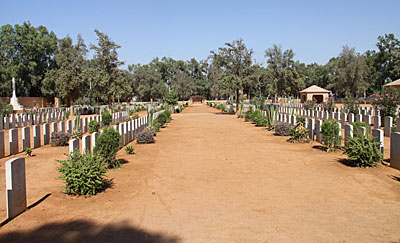Every November, we remember those lost in wars past and present, and as the 75th anniversary of VE Day, 8th May, approaches, I thought I would tell you about attending Remembrance Day services in two very different places.
My husband and I were posted by BP Exploration to Libya, living first in Tobruk and then moving 500 miles west to Benghazi. The British Commonwealth and German War Cemeteries were positioned on a slight rise overlooking the harbour at Tobruk that had seen the arrival and departure of many warships during the 8 month siege. In Benghazi the Commonwealth Cemetery is beautifully maintained in spite of the desert conditions. Green yuccas and Geraniums, vivid red, struggle to provide colour amongst the 1,200 or so pale grey headstones that stand upright in the red dirt blown in by ghiblis from the Sahara.
 Set out in regimentally straight lines the memorials are perfectly aligned, as though a ghostly Parade Ground Sergeant had shouted "Right Dress", and "Attention". From whatever angle you look they are like a frozen army waiting for their next command. A walk along the rows confirms the very young ages of the majority of men; teenagers and early twenty year olds in distressingly large numbers, their regiments a roll call of UK counties, Commonweath towns and cities, and Polish allies. Some headstones have only the poignant engraving "Known unto God".
Set out in regimentally straight lines the memorials are perfectly aligned, as though a ghostly Parade Ground Sergeant had shouted "Right Dress", and "Attention". From whatever angle you look they are like a frozen army waiting for their next command. A walk along the rows confirms the very young ages of the majority of men; teenagers and early twenty year olds in distressingly large numbers, their regiments a roll call of UK counties, Commonweath towns and cities, and Polish allies. Some headstones have only the poignant engraving "Known unto God".
On a bright sunny November morning, with pine trees scenting the air, a local church's portable organ and a canvas stool was hauled from the boot of my car and set up in the shade of the entrance portico. With music sheets held in place with a clothes peg and pumping like mad to fill the bellows I played a few chords just to check that nothing had been damaged in transit. It was always a bit disconcerting to have a slight delay between actually pressing the keys and the sound issuing from the organ.
Clouds of yellow dust announced the arrival of the British Consul in his official car together with his wife and assistant. Representatives from BP, various other British companies and members of all denominations filed into place. A few wore red hibiscus or bougainvillea blossoms in lieu of the non-obtainable poppies, but the Consul's secretary must have had a few sent out with the wreath in the diplomatic bag as he and his staff were the only ones wearing them.
A roving Church of England vicar, en route from Tobruk to Tripoli on Remembrance Day duties, handed out hymn sheets, gave me a nod and I started enthusiastically pedalling into the strains of Onward Christian Soldiers. While the organ wheezed out the notes, the fifty or so congregation manfully sang the words in an embarrassed British sort of way while the ghaffir and a few locals looked on from atop the perimeter wall. During the short address, I reflected on ceremonies going on in the UK at approximately the same time, and imagined military bands playing Oft in the Stilly Night, Eternal Father and Flowers of the Forest, for the march past the Cenotaph.
The next year, having been thrown out of Libya on the orders of Colonel Gadaffi, we attended an English service on a dark dank Sunday morning in the Cotswold Hills. The creamy local stone reminded me of the wall around the Benghazi cemetery. Wrapped up with scarves and gloves, we stood with frozen feet, watching the parade of boy scouts, girl guides and local army cadets. Local Government dignitaries in turn laid poppy wreaths around Minchinhampton war memorial. Birdsong interrupted the two minute silence and as the spine chilling notes of the Last Post died away my thoughts returned to that Portland Stone Army standing in their rows, and I hoped that they were now "At Ease".
